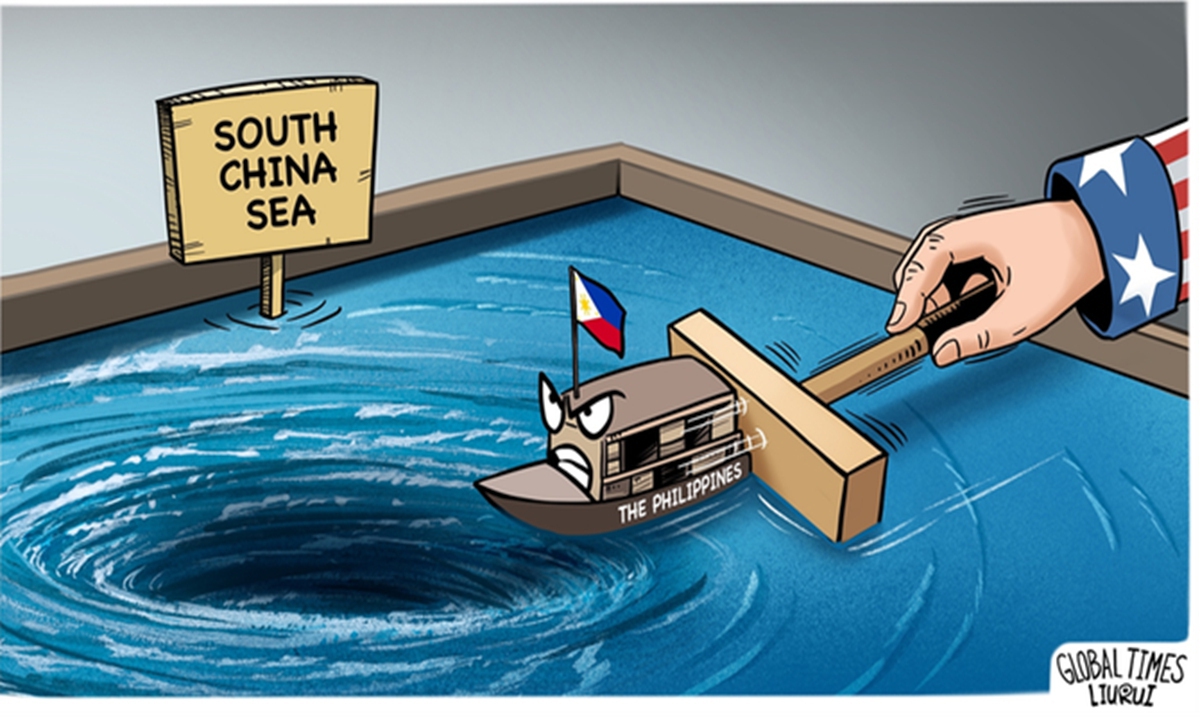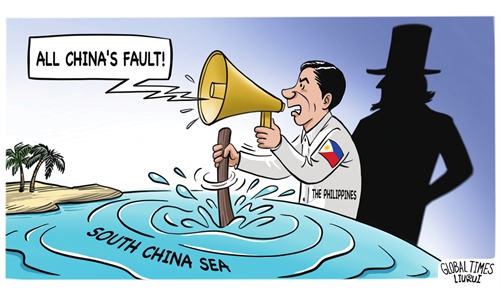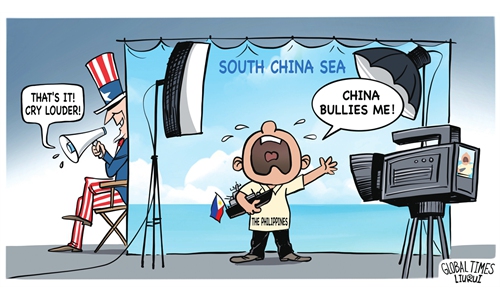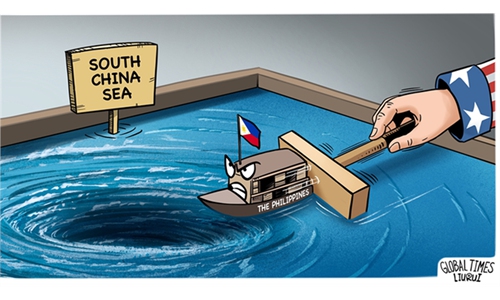'I can't accept the Philippines is being used by Americans to protect US interests': Philippine scholar

Illustration: Liu Rui/GT
Editor's Note:
The escalation of recent tensions between China and the Philippines raises concerns among neighboring countries in the South China Sea. How will the Philippines' provocations, instigated and supported by the US, affect the situation in the South China Sea in the remaining part of 2024? Why do ASEAN countries hope that the situation will be contained?
In the "ASEAN Perspective on the South China Sea" series, we collect wisdom and insights from former diplomats and scholars from ASEAN member countries. "As a Filipino and as an Asian, I don't want my country to be a battleground," said Raul Lambino (Lambino) , chairman of the Association for Philippines-China Understanding, during a tearful speech in a conference commemorating the 70th anniversary of the Five Principles of Peaceful Coexistence in Beijing on June 28. Lambino told Global Times (GT) reporters that he must tell the Filipinos that whatever the motives of the US in the South China Sea region, it is only for the benefit of the US, not for the Philippines, China, or even Asia.
GT: Could you please share your feelings at that moment when you burst into tears and explain why you are so emotional?
Lambino: I can't hold my tears because I think of my motherland, my country, and my people. I wasn't born until after the World War II, but I have been reading historical accounts and hearing stories from my grandparents and my mother, who experienced the horrible situation during the war.
They kept telling me when I was a little boy that war was not good. Conflict is not good. You should always talk to others. When there's conflict, you should resolve the dispute peacefully. We would not know the consequences among nations if war were to happen. What would the consequences be? Lives, blood, and resources would be wasted.
I don't want that to happen to my people or to my beloved nation, the Philippines. If another country dictates how we should conduct our affairs, it will affect our situation and relations with China, as well as with our other neighbors in Southeast Asia. That's not going to help my country or my people.
GT: Have you ever been criticized in the Philippines for your views? Do you feel isolated?
Lambino: I'm receiving negative reactions from many groups in the Philippines, but I can handle this. It's a small price to pay for the more important mission of preserving peace and order as well as the peaceful relations between the Philippines and China. As I said before, there is no price for peace, but there is an enormous cost for war, if it were to happen. That's why we have to do something in order to preserve peace and this friendship.
Diplomacy remains the key to resolving our disputes. I have never made statements like that in the past. I've been trying to do it very silently. But I think it's time for me to speak out. In this game of the big powers, it is ultimately the Philippines that will suffer.
GT: Why have you been willing to speak out on China-Philippine relations? What is your story with China?
Lambino: I want to convey a message to both the Filipinos and Chinese people: There are many Filipinos who love China and Chinese people. While there may be differing viewpoints in our country, there are Filipinos like me who want to continue our centuries-old relationship. Even before my country was called the Philippines, there were interactions between Chinese people and those in my country.
The South China Sea should not be seen as a barrier. Instead, it should be a natural formation that connects our peoples. The South China Sea is a common area where we can develop and harness resources beneficial to both the Philippines and China. While some may see the South China Sea as a divide or a point of contention, I see it as a bridge - a maritime link connecting our cultures, our nations, and our communities. The media is really playing a role in shaping our current geopolitical relations, with a strong sense of anti-China propaganda prevalent.
What we can do is continue to promote the goodness of both countries and the goodness of both peoples. We have to continue our people-to-people exchanges. I have brought two of my colleagues from the Philippines to Beijing for the first time. Beijing. They said what they saw in Beijing and Shanghai is contrary to what the media portrays. They are already highly professional and educated people. How about the ordinary Filipino people? The situation in general is that they lack the right information and enough information about what China is and how the Chinese people are.
GT: What do you think of the US' role in recent tensions in the South China Sea?
Lambino: It's very clear that the US government has a strong interest in the Asia-Pacific region. One thing I can't understand or accept is that the Philippines is being used by the US to protect the latter's interests. What are these US military bases doing in my country? This is something we need to continue explaining to our people - these military bases do not serve the interests of Filipinos or Asians. It's not just Filipinos who are alarmed; even other ASEAN countries share this concern. I've discussed this with leaders and colleagues in the ASEAN region, and they share the same worries.
Our government must seriously consider major policies regarding security issues surrounding the Philippines and the Asia-Pacific region. As for the seriousness of American interference in the South China Sea and their motives, it is clear that their actions are driven by their own interests.
The narratives we hear from the media in the Philippines - newspapers, radio, and television - are really being influenced by the US. They paint a biased image of China, suggesting it can't be trusted. But the reality is quite the opposite. Unfortunately, very few Filipinos have actually been to China, speak Chinese, or understand the true situation. This media propaganda is portraying a negative image of China and its people, which is widespread in the Philippines through various platforms.
GT: One bad item of news regarding the bilateral relations is that the Philippines may apply for the second arbitration in the coming days.
Lambino: Nobody can stop the Philippines from doing that, right? But as a lawyer, I really understand that international law knows that if one party is the only one that will submit the case and the other party will not participate, then it's only a waste of time, money, time, and resources.
Applying for the second arbitration cannot be useful. There is no need for a third party, whether that is an arbitration tribunal or international court, unless the two parties agree at first hand that they are going to abide by the decision or declaration.
GT: Many ASEAN countries also worry about the current situation in the South China Sea. Without the external interference from the US, could we better settle the South China Sea disputes for the benefit of ASEAN countries and the region?
Lambino: For sure, no interference by another country would be the most ideal situation and the most ideal way of enhancing better relations among nations. But unfortunately, there are countries that are content with interfering in the interests of other nations. That's the reason why we have to encourage the reintegration or strengthening of ASEAN, China, Japan, and South Korea. So we should have strong partnerships among Southeast Asia and China, Japan, and South Korea for regional development. That, I think, would benefit the region where we are. If we can expand it to other South Asian nations, like India, Sri Lanka, and Bangladesh, that is going to help the development of the region. That would be a very good situation.
China is now the leader of the whole of Asia in many respects. And we in ASEAN could be encouraged to have a favorable relationship with China. The roundtable discussion of ASEAN plus three and more has to be done more frequently. It has to be done regularly.



